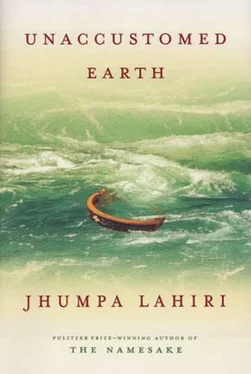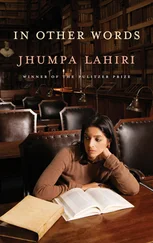"I'm sick of wasting time. And I want my car back. I hate not driving. I feel trapped."
She controlled herself, not telling him that it was ludicrous to expect their parents to trust him on the road again. "It's just two more years of your life, Rahul. Try to stick it out. Otherwise you'll end up hating yourself."
"Jesus, you sound just like them," he said and hung up on her.
She returned to Boston in April, during the break after the Lent term, a diamond ring from Roger concealed on a chain beneath her sweater, and this made her feel dipped in a protective coating from her family. After January her parents had not bothered her again about Rahul, telling her, the one time she asked, that he'd gone back to school. She felt guilty for distancing herself but not enough to counsel her parents, not enough to speak to Rahul. She had a ten-thousand-word dissertation to write on deregulation for her degree, and she had Roger, had moved in with him by then. She was surprised to see Rahul standing at the airport with her parents. All three of them looked sad, preoccupied, her parents perking up only when they caught sight of her behind her trolley piled with bags.
"Hey," she said, walking up to him, hugging him, though initially his long arms remained at his side. "It's good to see you."
"Welcome home," he said, and when he stepped back, she saw that he was not smiling.
"Is your semester finished already?"
He shook his head, still refusing to meet her gaze, and then a small, odd-sounding laugh escaped from him. "I live here now."
She had come home to tell her family about Roger, to tell them she planned to move permanently to London and marry him, but it was Rahul they had to talk about first. During the ride home from the airport she pieced together what had happened. It was her mother who did the talking; her father drove, muttering to himself now and then about the condition of the traffic, and Rahul spent most of the time staring out the window, as if he occupied the back of a cab. Though he returned to Ithaca after Christmas break, he'd stopped going to classes, and two weeks ago, after being formally dismissed from the university, he moved back to Wayland.
From what Sudha could tell, he was living in the house as if it were simply another vacation. He stayed in his room or watched television during the day. Their parents had sold his car, and so he never went out. Previously when he'd avoided them, there was something bristling in him, something about to explode. That energy was missing now. He no longer seemed upset with them, or with the fact that he was at home. For a while her parents told their friends that he was taking a leave of absence and then that he was in the process of transferring to BU. "Rahul needs a city in order to thrive," they said; but he never applied to other schools. They told people Rahul was looking for a job, and then the lie became more elaborate, and Rahul had a job, a consulting job from home, when in fact he stayed home all day doing nothing. Their mother, who had always hoped her children would live under her roof, was now ashamed that this was the case.
Eventually he got a job managing a Laundromat in Wayland three days a week. Her parents bought a cheap used car so that Rahul could drive into town. Sudha knew that the job embarrassed her parents. They had not minded him washing dishes in the past, but now they lived in fear of the day someone they knew would see their son weighing sacks of dirty clothes on a scale. Other Bengalis gossiped about him and prayed their own children would not ruin their lives in the same way. And so he became what all parents feared, a blot, a failure, someone who was not contributing to the grand circle of accomplishments Bengali children were making across the country, as surgeons or attorneys or scientists, or writing articles for the front page of The New York Times.
Sudha was among those successful children now, her collection of higher degrees framed and filling up her parents' upstairs hall. She was working as a project manager for an organization in London that promoted micro loans in poor countries. And she was spoken for. In the summer, she and Roger flew to Massachusetts so that he could meet Sudha's family and ask formally for her hand. At Roger's request they stayed not in Wayland but in a hotel in Boston; by now she knew him well enough to accept that he would maintain a limited exposure to her family, just as he guarded his body, on the beach, from the rays of the sun. "Better to be up front about these things at the start," Roger had told Sudha in his kind but firm way, and she took this as another sign of his responsible nature, his vigilance toward their life together. The hotel arrangement was accepted by her parents without protest; Rahul had stripped them of their capacity to fight back. They accepted that she and Roger planned to have a registry wedding in London, that they were willing to have only a reception in Massachusetts, that Roger had been previously married, that he and Sudha had a fourteen-year gap. They approved of his academic qualifications, his ability, thanks to his wisely invested inheritance, to buy a house for himself and Sudha in Kilburn. It helped that he'd been born in India, that he was English and not American, drinking tea, not coffee, and saying "zed" not "zee," superficial things that allowed her parents to relate to him. Sudha felt that they were not so much making room for Roger in the family as allowing him to take her away. But Rahul had not loosened his grip; he asked Roger questions, combing through the current issue of Roger's art magazine that her parents had admired and set aside, doing his part to inspect his sister's future husband for flaws.
"Roger's a good guy," Rahul told her when the two of them were alone in the kitchen clearing plates. "Congratulations."
"Thanks. Thanks for being here," she said. She meant it; she'd never brought a man to the house, hadn't realized how nervous she'd be.
"Got nowhere else to go."
"So, how are things?" she asked. "It's not driving you crazy, living at home this way?"
"It's not so bad."
She was grateful that he was talking to her, afraid to pressure him. She was aware of a horrible imbalance between them. She felt accused, simply because her life wasn't broken in the same way.
"How's the Laundromat?" He shrugged.
"Are you still writing your play?"
"It was stupid."
Not knowing what else to do she stepped forward to hug him, and it was then that she smelled the liquor, sweet, strong, unmistakable. During lunch he'd gotten up from the table once; now she realized he'd gone wherever the bottle was hidden. He was not drunk, there was nothing about his behavior to indicate that he'd had more than a single drink. But the fact that he'd consumed the alcohol in stealth, that he could not endure her family's company without it, made her realize that Rahul was not simply fond of drinking, or a social drinker, or a binge drinker, which were all the ways she'd rationalized it until now.
"You're welcome to visit us in London any time," she offered, saddened by the fact that she did not mean it.
"I don't have any money."
"I'm sure Baba would buy you a ticket."
"I don't want his money," Rahul said.
You live in his house, she wanted to point out. You eat the food Ma puts on the table. You let them put gas in your car. But she said none of this, knowing that if she did, the door he tentatively held open for her benefit would slam once more in her face.
In the months before Sudha's wedding reception, planned for the fall, Rahul began dating a woman named Elena. Elena was an aspiring actress, and she was a waitress at a diner in Waltham. He had conveyed these facts to Sudha when she came back to Wayland ten days before the reception, without Roger, who would be flying in for the party alone. "I've never felt this way before, Didi," he told her. A few days before the reception he brought Elena home. Sudha was a married woman now, but being without Roger made her anxious, that protective coating he provided suddenly thinning. Elena was thirty, eight years older than Rahul. But she could have passed for a high school student, wearing tight jeans and a tank top, her long brown hair fastened at one side with a barrette, dark liner rimming her eyes. She was quiet, speaking only when spoken to, not working to charm Sudha's parents as Roger had. She told them she'd grown up in Mattapoisett and had gone to Emerson. She did not eat the rice Sudha's mother served with lunch, saying it caused her bloating. Rahul kept his arm around her thin shoulders, kissing her dreamily in front of everyone. He spoke on Elena's behalf, saying she had once made a commercial for an allergy medicine. He kept mentioning someone named Crystal; it turned out that Crystal was Elena's daughter from a previous boyfriend.
Читать дальше












